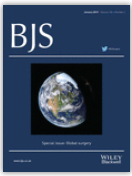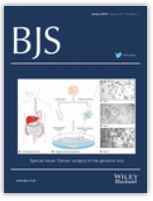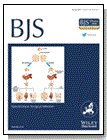Global surgery (2019)

The overarching theme of global surgery addressed in this special issue curated by the BJS brings essential material on global health issues. Global surgery may resonate most with those in low‐ or middle‐income countries (LMICs) where basic surgery needs are rarely met and even the most trivial resource may be hard to obtain on a permanent or reliable basis. The themed issue is focused on the improvement of surgery and surgical access worldwide.
Cancer surgery in the genomic era (2018)

Not surprisingly, when BJS put to vote of its readers (via Twitter) the subject matter of this special issue, the majority chose cancer care in the genomic era. Surgeons have long provided cancer care, especially for hollow and solid organ tumours where complete excision is central to curative management. Improved outcomes have been achieved by refinement of neoadjuvant therapy via genomics and the related areas of transcriptomics, proteomics and microbiome research. Through a series of selected, invited and submitted articles in diverse fields, BJS has curated a special issue dedicated to cutting-edge clinical and laboratory science that is freely available to access. The focus in this issue is how these -omic techniques will change and influence the way surgery is planned or performed.
Surgical infection (2017)

BJS is dedicating a special issue to surgical infection because infections in surgical patients are common, debilitating and costly. In the days of modern antimicrobials, infection is frequently overlooked as a salient issue by the surgical clinical and research community. The alarming rate of development of antimicrobial resistance globally has brought infection into sharp focus. In this issue of BJS we focus on all aspects of surgical infection including prevention, diagnosis and treatment. Established treatment strategies such as preoperative skin preparation are re-evaluated and novel ones such as vaccination prophylaxis against wound infection explored.
Surgery in the elderly (2016)

The global population is growing in numbers and the proportion of elderly people is increasing. By 2050 it is estimated that about 16 per cent of the world’s population will be aged over 65 years, twice the current number and a fivefold increase since 1950. Projections from the World Health Organization, United Nations and the EU commission all point to ageing as a major challenge for society with a directed response needed to meet the needs of the elderly. The challenge is global. The greatest increase in the ageing population is expected in developing countries. Although this poses a particular challenge where health coverage is generally poor, economic burdens for healthcare systems will inevitably rise in high‐income settings as a result of the greater needs of the elderly, particularly when independent living is no longer possible.
Surgical innovations (2015)

This special issue of BJS covers some aspects of innovation in surgery. It is difficult, if not impossible, to pinpoint when innovation in surgery actually started. Although most surgeons would instinctively associate innovation in surgery with the introduction of novel techniques or new instruments, there is more to it than this. Innovation is intrinsically linked to curiosity and may therefore take many forms.
Emergency surgery (2014)

Over the past century, safety and quality of care in elective surgery have improved considerably, leading to better patient outcomes. A variety of factors have contributed to this, including support from perioperative medical specialties, improved equipment and technical advances, less invasive interventions and surgical specialization. This transformation of elective general surgery into a series of specialties has led to widespread concerns regarding the adequate provision of similar expertise for urgent presentations of surgical illness.
Improving outcomes in gastrointestinal cancer (2013)

Malignancies affecting the gastrointestinal tract have always been considered aggressive tumours with a poor prognosis. Less than 25 years ago many clinicians viewed pancreatic cancer as incurable, and patients with oesophageal and gastric cancer were thought to have only a 5 per cent chance of long-term survival. Although colorectal cancer was associated with a better outcome, metastatic disease was still considered a terminal event. Critical clinical trials have disproved most of the above.
Trauma (2012)

This special issue on trauma highlights established and emerging areas in injury care ranging from epidemiology to epigenetics. It does not attempt to cover the complete trauma chain of survival; rather, the collection reflects areas of current and ongoing interest, explores translational aspects of pathophysiology in trauma care, discusses changes in concepts and paradigms, and gives ‘best evidence’ even where this is still guided largely by expert opinion and limited data.

